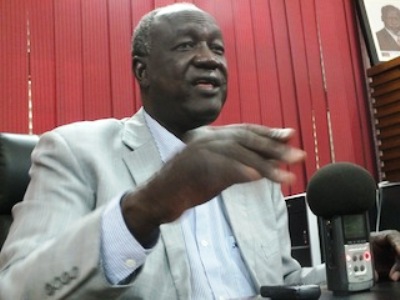South Sudan’s defence minister says nation not yet free
September 25, 2015 (JUBA) – South Sudanese defence minister, Kuol Manyang Juuk, said on Thursday that the new nation is not yet free, saying it has been held hostage by internal divisions, hatred and sectionalism that requires the young, educated citizens to free the country.

“We are not yet free from hunger, from hatred, from tribalism and from backwardness,” said Manyang, who helped mobilized 8,000 children in 1986 and moved them to Ethiopia in 1987.
Many children, all well below the age of 15 years, died of diseases and malnutrition. Those who survived returned to the villages in South Sudan in 1990s and others went on as refugees in Kenya where they pursued education.
Thousands of the red army children were resettled in the United States, Canada and Australia and got better education. The RAF was formed in 2013 to remember those children and their contributions to the SPLM, the former rebels that now govern South Sudan.
Thursday ceremony, under the theme: “We are who we are today because of you, thank you,” was honouring former teachers, camps managers and military rebel commanders who mentored them.
“We want to support our government in nation building and we need to
partner with the people of South Sudan,” said Deng Bol, the chairman of RAF.
Bol said RAF is mobilizing to preserve the legacy of SPLM in South Sudan and inspired patriotism as a foundation for building the nation.
Minister Manyang said the youth, who are 35 or more years, should use their education and tribal diversity to instil national identity.
“South Sudan is now [politically] free, we are now independent nation but we are not yet happy,” he said, giving examples of the current war being fought by members of the SPLM over democracy, reforms and leadership.
General Pieng Deng Kuol, the inspector general of police and a former commander of the army, said RAF should focus on policies that drive the government to deliver services to the people a legacy to remember those who died during the war of liberation.
“It is very easy to tell me and to tell Kuol Manyang that you have been given enough appreciation but what about those who have died, how are you going to appreciate him or her?” he said.
He said having witnessed the death of their colleagues as children, living through hunger, poverty in displaced persons camps, the youth are in a better shape to guide national leaders.
“And therefore, you should be the best. You should be the best who will really preach the peace because war is really not good,” he said adding “I do remember in 1987 when me and some of you were not able to bury some of your colleagues who were dying in tens a day.”
The police chief cited South Sudanese displaced during the last twenty one months of conflict in United Nations camps as an example of continued horrors the country is going through.
He said the peace agreement, signed last month, is an opportunity to reconcile the nation and open a new page.
(ST)
